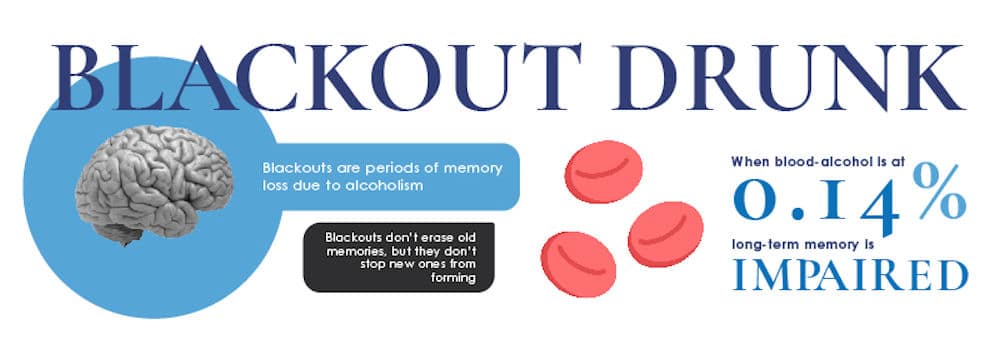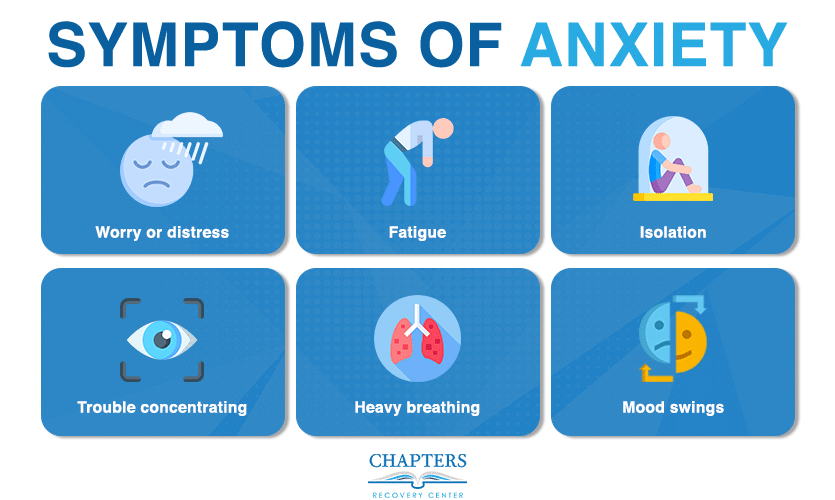Have you ever had so much to drink that you experienced gaps in memory? Maybe your friends or partner had to fill you in on your behavior the next day after drinking. Or perhaps you woke up to discover that you could not remember how you got home. Blacking out, or being blackout drunk, happens when you drink too much, too quickly.
Blacking out usually occurs when someone engages in binge drinking. That is defined as drinking four or more alcoholic beverages within two hours for men, or three or more drinks in that same time period for women. According to the National Institute on Alcohol Abuse and Alcoholism (NIAAA), blacking out is most likely to happen when your blood alcohol concentration (BAC) reaches 0.15%.
If you engage in binge drinking and have experienced memory loss while you were drunk, you likely blacked out. In this blog, we are going to discuss what happens to the brain and body when you black out. We will also go over why this is a dangerous practice and how to avoid blacking out while drinking.
What Does it Mean to Get Blackout Drunk?
If you black out, it means that you have temporarily lost the ability to create new memories. That’s because alcohol interferes with the way your brain stores information. When you black out, you may be able to carry on a conversation and appear to be sober. But you will not be able to remember some or all of what happened during that time.
As previously mentioned, blacking out usually occurs when a person’s BAC reaches 0.15%. This is twice the legal limit for driving, which is 0.08%. When an individual’s BAC reaches this level, they may experience one of two types of blacking out:
- Complete blackouts: This type of blackout is when a person cannot remember anything that happened while they were drinking.
- Fragmentary blackouts: This type of blackout is when a person can only remember bits and pieces of what happened while they were drinking.
It’s important to note that blacking out from alcohol is different from passing out. When you pass out, you will lose consciousness and will not be able to wake up until your body has metabolized the alcohol. Blacking out, on the other hand, does not involve losing consciousness. You may be able to carry on a conversation or even walk and talk, but you will not remember everything later.

Blacking Out and the Human Brain
When a person is sober, memories are formed by the brain collecting sensory input. This input is converted to electrical signals that travel from the senses to the hippocampus. The hippocampus is responsible for encoding these experiences into long-term memories.
First, short-term memories are encoded, and then sensory input is moved through a similar process, forming long-term memories. Alcohol interferes with this process by preventing the hippocampus from sending electrical signals to the cortex, where long-term memories are stored.
This interference prevents new memories from being formed, which is why people who black out from drinking cannot remember what happened during their blackout. The brain continues to process information but is not able to form new memories during this time.
Who is at Risk for Blacking Out While Drinking?
While anyone can experience blacking out from alcohol, there are factors that affect how likely certain groups are to experience blacking out. One such group is women, who are more likely to black out from alcohol than men. For women, alcohol will reach higher concentrations in the blood more quickly than it does for men. Differences in hormones, body composition, and physical size all affect how much alcohol is needed to induce intoxication and subsequent blackouts. Additionally, there are also certain medical conditions that can increase the risk of blacking out. These include:
- Sleep disorders like sleep apnea
- Eating disorders
- Psychiatric disorders like anxiety or depression
- Heart conditions
Additionally, teens are at a greater risk of blacking out due to alcohol consumption. This is because the brain is still developing during these years and is more vulnerable to the effects of alcohol. Adolescents are also more likely to binge drink because of their lack of experience with drinking. They may not know their limit or may underestimate how much they have had to drink. Further, adolescents may drink more because they do not know when they will be able to drink alcohol again.
Young adults are another group that is at a higher risk for blacking out. This is because they are more likely to binge drink than adults over the age of 26. Further, young adults are more likely to take part in risky behaviors while under the influence of alcohol. This increases the likelihood that they will sustain an injury or harm themselves in some way while blacked out.[vc_row][vc_column width=”1/2″][vc_column_text]
What are the Symptoms of Blacking Out From Drinking?
There are a few different symptoms that may indicate that someone around you is blacking out from drinking. First, they may have trouble standing or walking. They may also slur their words or have difficulty speaking. Other indicators of someone being blackout drunk include the following signs and symptoms:[/vc_column_text][/vc_column][vc_column width=”1/2″][vc_single_image image=”852″ img_size=”full” alignment=”center”][/vc_column][/vc_row]
- Forgetting what they are saying, or doing
- Being easily distracted
- Repeating questions or sentences without remembering
- Uncharacteristically lacking empathy or having no concern for the thoughts and feelings of people around them
- Engaging in risky behaviors they normally would avoid while sober
- Being unaware of their surroundings
It can be difficult at times to determine if someone is blackout drunk. They may be able to engage in regular activities such as conversing, eating, or continuing to drink. However, blackouts are often associated with a change in behavior. For example, a person who is normally shy may become more outgoing or a person who doesn’t normally curse may start using profanity.
How to Avoid Blacking Out While Drinking
If you are worried about becoming blackout drunk when drinking, there are ways you can prevent memory loss associated with a high BAC. The following measures can prevent blacking out:
- Don’t drink on an empty stomach: Eating before or during drinking can help slow the absorption of alcohol into your system
- Pace yourself: Drinking too much alcohol in a short period of time can lead to blacking out. Pacing yourself by having one drink every hour or so can help you avoid blacking out.
- Avoid “drinking games”: These often involve consuming large amounts of alcohol in a short amount of time.
- Do not mix alcohol with other substances: Mixing alcohol with other drugs, including over-the-counter and prescription medications, can lead to blacking out.
- Know your limit: Everyone has a different tolerance for alcohol. Be aware of how much you can drink before you start to feel the effects. This will help you avoid blacking out.
- Avoid hard liquor: Liquor has a higher alcohol content than beer or wine. Drinking hard liquor can lead to blacking out more quickly than drinking other types of alcohol.
- Drink plenty of water: Staying hydrated can help you avoid blacking out. Be sure to drink water in between alcoholic beverages.
Misconceptions About Blacking Out

- Memories will return once a person is sober: This is not always the case. In some instances, memories may never return.
- A person has to be very drunk to black out: Blacking out can happen after only a few drinks.
- People who black out are more likely to be alcoholics: While blacking out may be a symptom of alcoholism, it does not mean that the person qualifies as having an alcohol use disorder.
- Certain types of alcohol are more likely to cause blackouts: Any type of alcohol can cause blacking out.
- People who black out are just trying to get attention: Blacking out is not a choice. It is a serious issue that can have potentially life-threatening consequences.
- You can’t function during a blackout: In some cases, people who black out from drinking are able to function somewhat normally.
Is Blacking Out a Sign of Addiction?
Blackouts can occur in anyone who drinks too much alcohol. However, your drinking habits can indicate that you have an alcohol addiction as they are more common in people who abuse alcohol or have alcohol use disorders. If you black out frequently, it may be a sign that you’re struggling with alcoholism.
When blackouts occur along with the other symptoms associated with alcohol use disorder, it is important to seek professional treatment. The following signs can point toward the presence of alcoholism:
- Being unable to control the amount you drink when you drink.
- Building a tolerance, or needing to drink more alcohol to feel the same effects.
- Experiencing withdrawal symptoms when you don’t drink.
- Spending an increasing amount of time thinking about drinking or struggling with strong urges to drink.
- Continuing to drink despite social, relationship, occupational, or financial consequences.
- Isolating yourself from friends and family in order to drink more.
- Wanting to cut down on the amount you drink, but being unable to.
- Drinking in inappropriate situations such as when you’re driving.
- giving up on beloved hobbies to drink more.
If you are experiencing a combination of the aforementioned signs of alcoholism, it is important to reach out for help as soon as possible. There are a number of ways to get help if you think you might be struggling with alcoholism. There are many different treatment options available, including detoxification and outpatient addiction treatment.
Recovering from Alcohol Use Disorder with Chapters Recovery Center
If you or someone you love is struggling with alcohol abuse, it’s important to seek professional help. Alcoholism is a serious disease that can lead to a number of devastating consequences, including job loss, financial problems, relationship issues, and health problems.
At Chapters Recovery Center, we offer comprehensive treatment for alcoholism and alcohol abuse. Our programs are designed to meet the unique needs of each individual, and our goal is to help our clients achieve long-term sobriety.
We offer a variety of treatment options, including detoxification, outpatient treatment, partial hospitalization, and intensive outpatient care. Our experienced staff will work with you to create a customized treatment plan that meets your specific needs. Contact us today to learn more about how we can help you.







